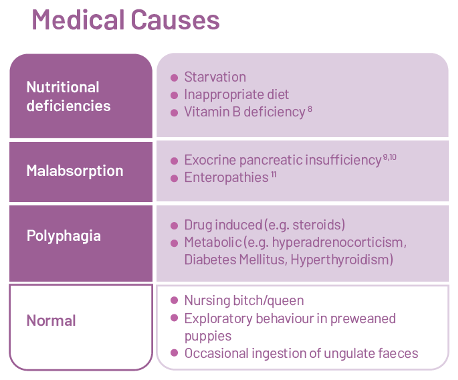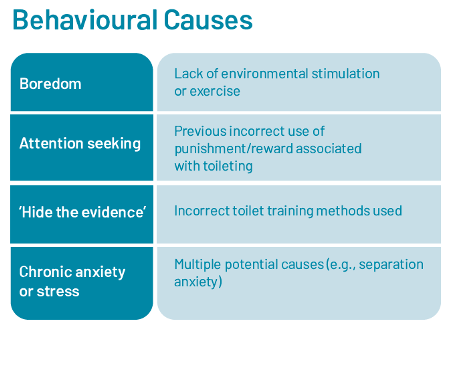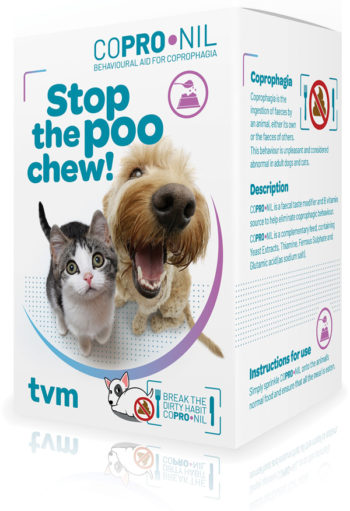Coprophagia is the ingestion of faeces by an animal; up to 23% of dogs may eat faeces, with 16% being regular offenders1. Coprophagia may increase the risk of pathogen transmission (some of which may be zoonotic)2,3,4 and rarely, result in medication toxicity5,6.
Ultimately, the behaviour is unpleasant for many owners and in severe circumstances may even be a reason for them to consider rehoming or euthanasia7.
Just…why?
In the majority of adult dogs, coprophagia is an abnormal and undesirable behaviour with a number of potential medical or behavioural causes. Taking a detailed history will help to pinpoint the underlying cause(s) and decide on the most appropriate course of action.
 |
 |
While it is important to identify and treat underlying medical causes, the majority of cases are behaviour-associated1 and therefore require behavioural modification training to help resolve the behaviour.
Addressing the behaviour
As with many behavioural problems, habits can become ingrained, so clients must be educated that patience and perseverance are required to resolve coprophagia. Behavioural modification training is the cornerstone of treatment and consists of:
- addressing root causes of underlying chronic stress or anxiety
- redirection training – ensuring dogs have excellent ‘recall’ and ‘leave it’ cue training, so that their attention can be diverted away from faeces
- response substitution – training the dog to display an alternative behaviour when encountering faeces, such as returning to the owner
- limiting access to faeces (and therefore temptation) whilst training takes effect, by making sure dogs are correctly toilet trained, gardens are kept free of faeces and keeping dogs on leads during walks
- use of faecal taste modifiers to make faeces unpalatable, to help break the pattern of behaviour
It is important clients don’t punish their pet when slip ups occur, as the dog may see this increased ‘attention’ as reward, inadvertently reinforcing the behaviour. It may also encourage the dog to consume faeces more rapidly in future in an attempt to ‘hide the evidence’.
‘Break the dirty habit with COPRO-NIL’
COPRO-NIL is a faecal taste-modifier and behavioural aid to help with the correction of undesirable coprophagic behaviour.
COPRO-NIL also provides a comprehensive B vitamin source as deficiencies in B vitamins may contribute to coprophagia8.
Ultimately, it makes the faeces highly unpalatable to the dog, giving the owner opportunity to break the cycle by modifying behaviour.
- COPRO-NIL is presented as a tasty powder that is sprinkled onto wet or dry food for 10-14 days.
- Administer 0.5g/kg per day (1 level teaspoon per 10kg).
- Presented in 100g tubs.
Downloadable handouts to help clients with the training methods mentioned are available, along with more information on COPRO-NIL, by visiting www.tvm-uk.com/coprophagia
Alternatively, contact your local TVM territory manager or email help@tvm-uk.com


Leave a Reply